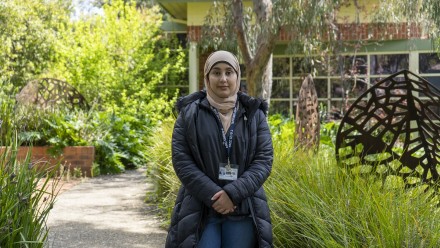Student experience: Ayesha Alhassan, Master of Public Health
Share
Meet Ayesha Alhassan – recent Master of Public Health (MPH) graduate. Ayesha plans to use the skills she learnt during her MPH experience to pursue a career in the public health field.
Why did you decide to study a Master of Public Health at ANU?
I completed a Bachelor of Health Science and many of the compulsory subjects within the degree were centred around both public and population health.
I then had the opportunity to do a vertical double degree, being the Master of Public Health. Given my undergraduate studies and interest in health, I enrolled. Additionally, I had the opportunity to complete the course in one year instead of two. So that was a privilege of the undergraduate degree. I then decided to do the research component of the MPH as well – making it an MPH Advanced.
What did you particularly enjoy about the MPH?
The course work was fun and practical. We covered a range of topics, for example epidemiology, biostatistics, and global health, and all the coursework lecturers were great. The research component of the degree was also really rewarding, and I enjoyed the opportunity to work more independently. Despite having to move online due to COVID-19 interruptions, I still think it was one of my best university experiences.
I also volunteered for an internship at ACT Health at the beginning of the MPH. There I worked as part of a team working on redesigning the ACT Quarterly Performance Report (QPR) using new data visualisation methods to improve ACT Health’s reporting approach of the QPR. The team I worked with was really supportive, had a nice working environment, and gave me some valuable real-world experience.
Can you describe your research project as part of the MPH (Advanced) degree?
I worked on a collaborative project between the Population Health Exchange (PHXchange, ANU) and the ACT Health Directorate, summarising longitudinal studies that collect data about healthy aging. I identified Australian studies that sampled people aged 45 years and older, and created multiple tables identifying the variables each study covered.
This work provides a useful resource for policy makers to identify existing longitudinal studies that can be accessed to inform policy. For example, if policy areas want to consider mental health of older people, they can use the table summaries I compiled to find longitudinal studies that include relevant variables, such as psychological and/or cognitive health variables, to help answer their policy questions. I think this research highlights the benefits of utilising existing longitudinal studies to inform policy.
How do you think the MPH has prepared you for your future career in health?
I learnt many new things, including the very useful skill of data analysis using a statistical package like STATA. When I first started using the program I thought – wow, this full on! But the lecturers were really good at explaining and walking us through it. Many jobs require you to know how to manage and analyse data, so I’m glad I had the opportunity to learn this skill.
Learning how to conduct outbreak investigations as part of my epidemiology course, is also a useful skill I learnt through the MPH. This will be particularly useful for me, as I would like to enter the epidemiological field. Additionally, through the research component of the MPH, I learnt important skills in time management and report writing.
*Ayesha now works as a research assistant with the PHXchange.










